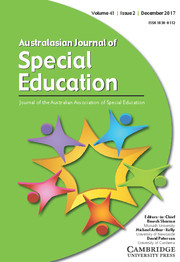No CrossRef data available.
Article contents
The Effects of Using a Writer in Examinations on Senior Students With and Without Learning Disabilities
Published online by Cambridge University Press: 26 February 2016
Abstract
Provision of a writer for students with learning disabilities in examinations is still controversial among some academics and teachers. This is partly due to a lack of empirical research demonstrating the effects of such provisions on the performance of the student with learning disabilities compared to that of the student without learning disabilities. This study addressed the question of equity in the granting of such a provision, by reviewing the literature on the factors relevant to the written compositions of students with learning disabilities. An exploratory study of the examination scripts of students with learning disabilities and students without learning disabilities was conducted. The scripts were produced with and without the provision of a writer. The study revealed that while students with learning disabilities performed considerably better when using a writer, students without learning disabilities appeared to perform worse. A follow-up questionnaire explored some possible reasons for this pattern of performance. The paper concludes that, while there are still unresolved problems surrounding the use of a writer, such a provision for students with learning disabilities may not put students without learning disabilities at a comparative disadvantage, and so may be accepted as equitable. Further research is suggested.
- Type
- Research Article
- Information
- Copyright
- Copyright © The Australian Association of Special Education 1996


